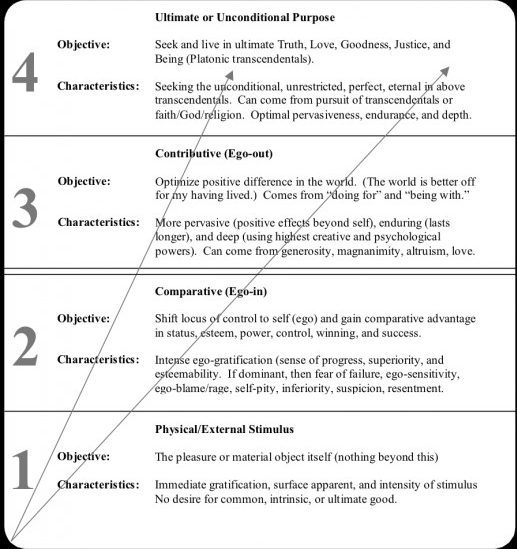What is happiness? This question has inspired voluminous writing from ancient times until today. One of the greatest philosophers, Aristotle, addressed the question of happiness in his work, the Nicomachean Ethics. For Aristotle, ethics, the topic of moral good and evil, is the stage where achieving happiness takes place.
He starts the Ethics off by discerning that “Every art and every inquiry, and similarly every action and pursuit, is thought to aim at some good; and for this reason the good has rightly been declared to be that at which all things aim.” (NE 1.1094a 1-3) The art of ethics aims at the highest good, happiness.
According to Aristotle, we choose only what we perceive as good, we never choose anything for the sake of evil itself. For instance, say I decide to partake in an extra glass or two of cabernet which takes me from relaxed to tipsy. Even though I know I probably shouldn’t drink that last glass, I may do it, because I believe it will make me happy (i.e. experience greater pleasure).
Every choice we make, whether good or bad, is decided because we believe it will make us happy.
We even make the hard choices for the sake of happiness. Take for instance, when you ran that extra mile even though your legs and chest were screaming at you. You made that painful choice, because in the long run (no pun intended), you believed it would make you happy. For this reason, Aristotle states that happiness is the one thing we seek for its own sake.
If Aristotle is correct, then this one concept, “happiness,” is at the root of every decision we make and every action we perform, and therefore it determines whether we think our lives have meaning, whether we are going somewhere, whether we are successful, whether our life is lived to the full, and even whether we feel that our life is worth living.
Philosophers throughout the ages, including Plato, Aristotle, Soren Kierkegaard, Josef Pieper, Edith Stein, and St. Thomas Aquinas have concluded that there is a hierarchy to our desires for happiness. Bodily pleasures, as intense and enjoyable as they can sometimes be, are at the bottom because they are the least pervasive, enduring, and deep. Transcendent or eternal things hold the top position. Fr. Spitzer elaborates extensively on the four levels of happiness in several articles and videos, but this chart provides his system at a glance.

Levels 1 and 2 happiness are good (i.e., legitimately rewarding), but they are not enough. We need more, but unfortunately many people don’t even realize what they are missing out on. They’re content to live for worldly success, comfort, and pleasure. But that’s not what we were created for. Pope Emeritus Benedict echoed the sentiment of the aforementioned philosophers when he wrote, “The world offers you comfort, but you were not made for comfort, you were made for greatness.”
Future posts in this series will be looking at an article by Father Spitzer on moral conversion. In this article Father suggests that by combining Ignatian spirituality with methods for increasing “self-efficacy” one can take their life from ordinary to extraordinary. These self-efficacy methods, which were developed by renowned Stanford psychologist Dr. Albert Bandura, have proven successful in many different contexts including sports, business, education, and more. By coupling spiritual practices and psychology Fr. Spitzer shows us how we can attain the freedom that comes from virtue and escape the slavery of vice.
Before ending this first post in our series on moral conversion,we want to clarify that in this series we will be using the term "happiness" as it is understood by a long lineage of philosophers such as Plato, Aristotle, Augustine, and Aquinas. This definition of happiness differs significantly from popular usage, which equates happiness to an emotional high. For these thinkers (and many others) happiness is a state of mind that comes from fulfilling one's ultimate goal or purpose. For Christians, the ultimate goal is union with God in Heaven, but during our earthly pilgrimage we can achieve a foretaste of this perfect and permanent happiness. This series will provide some guidance and practical tools for discovering purpose and obtaining happiness.
In subsequent posts, we will explore how to implement Ignatian spirituality along with techniques derived from Bandura’s self-efficacy to find your purpose in life and to reach level 3 and 4 happiness.
